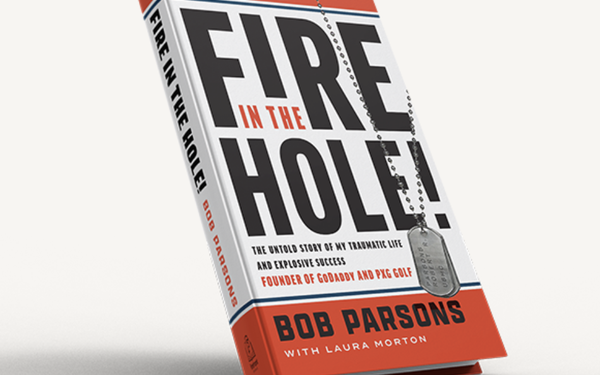
“Fire in the
Hole!: the Untold Story of my Traumatic Life and Explosive Success,” is GoDaddy founder Bob Parsons’ startling memoir.
A billionaire and serial entrepreneur, he’s had a
business life worthy of many exclamation points.
But Parsons also has reason to include “trauma” and “explosions” in the subtitle. He’s candid about his
hard-knock upbringing in Baltimore, which led him to enlist in the U.S. Marines at 17.
It was the height of the Vietnam War. He served there as a combat Marine, which left him with lifelong
PTSD.
More on that later. But the still-teenaged Parsons survived the military with a Purple Heart and other awards, and he credits the Marines for giving him the discipline, focus and
responsibility that led to his success.
advertisement
advertisement
He came back from the war a different kid. From being a terrible student (he flunked fifth grade), he used the GI Bill to get an accounting
degree, graduating magna cum laude. By then he also was a husband and father.
After working his way up to controller in a leasing company, he was on a business trip in San Francisco and
decided to kill time by visiting the campus of Stanford University. In its bookstore, he picked up a volume on how to write code and discovered a powerful talent and passion.
That led to his
founding of Parsons Technology in 1984. That software company started with a family finance program, and then he developed a a state-of-the-art personal tax package. He often worked writing code until
he was so sleep-deprived that he started hallucinating.
Ten years and hundreds of iterations later, Intuit bought the company for $64 million.
That gave him the capital to found Go
Daddy, which he sold a portion of in 2011 for $2.3 billion. But there was much sweating along the way.
Full disclosure: I got to know Bob during those go-go GoDaddy years, when we’d
be opposing talking heads on TV news shows, in segments about his controversial, headline-grabbing Super Bowl commercials. I was on to critique the sexism of the spots.
Bob was a natural
on camera and didn’t rankle.
Behind the scenes, almost like wrestling, we became friends.
If you recall, in those more innocent times, many of the GoDaddy ads played off some
outrageous sexual joke in the hopes of breaking some new standard of network indecency. Parsons understood that getting the ad “banned!” would result in tens of millions of dollars
in free media exposure, sometimes without the expense of running the ad at all.
It turns out that in addition to being a math whiz and the hardest working man in the startup biz, Bob had a
preternatural understanding of marketing and how to use advertising.
In “Fire!” he tells the birth story of what would turn into GoDaddy, and it’s a hell of a read. All
he knew was that he wanted to do something “involving the Internet.”
He basically created the domain name biz, including his own company’s unforgettable name and
logo.
“Big Daddy, Fat Daddy, taken,” he writes. Then he recalled that AOL had used the “Go” command, and that made all the difference.
He funded GoDaddy with
his own cash, and struggled, but reveals it finally got going on the back of the dot-com crash.
By 2004, GoDaddy had about a 16% market share worldwide, which wasn’t moving in the
way Bob wanted. He hired a market research company that told him, “people don’t know you exist.” They suggested the far-out idea of using mainstream advertising to get through to
consumers.
So, taking his usual baby steps, Bob bought an ad on the Super Bowl.
His advertising mojo carried through to creating a spot that spoofed the previous year’s
“wardrobe malfunction.” With much back and forth, Fox News Standards and Practices finally approved it the week before the Bowl.
Days later, they offered him a deal on a
second spot, and he took it, but there wasn’t time to create a new commercial. So he decided to run the first one twice.
Except that after the first one ran, Fox pulled the second,
saying it was “out of tenor with the rest of the ads.”
Bob had a blog at that point, and when word got out about this outrage, he did media interviews dawn to dusk. He also got a
settlement from the network. And GoDaddy continued to thrive and run much-talked-about Super Bowl ads for years.
The book is packed with great advice and stories, too many to include
here.
Post-Go Daddy, Bob went on to found PXG,(Parsons Xtreme Golf) as that game became another of his passions.
Philanthropically, he and his wife, Renee, launched the Bob & Renee
Parsons Foundation in 2012.
Every year, it gives away $25 million, making a profound difference in the lives of wounded veterans, military families and first responders.
But his most
provocative breakthrough is in treating PTSD, an area once considered verboten for tough guys to talk about.
In his own search for relief, he tried psychedelic therapy, and now advocates for
the legalization of psychedelics, used with assisted therapy.
His foundation gave $5 million to Mount Sinai to create The Parsons Research Center for Psychedelic Healing.
When I
asked Bob what surprised him most about the success of his book, he said, “I was surprised to hear from many of my fellow veterans who identified with my story and expressed their
appreciation for how open I was in sharing my trauma and battle with PTSD....
"We need to …speak up, seek help, and advocate for new treatments. …I will use my book, my voice,
and my platform to do so.”
Pretty good for a hardscrabble kid who failed fifth grade.